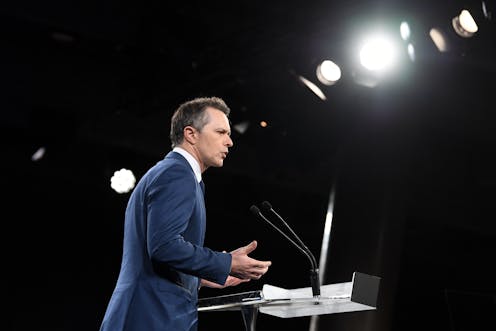New Education Minister Jason Clare can fix the teacher shortage crisis
- Written by Pasi Sahlberg, Professor of Education, Southern Cross University

One of Labor’s key education pledges is A$50 million to encourage school leavers with an ATAR over 80 to study teaching. This is part of the new government’s plan to “fix teacher shortages”.
The teacher shortage in Australia has reached crisis levels. But this must be addressed by improving the working conditions for existing teachers, not by cash incentives to university students.
Thousands of vacancies
Teaching is no longer an attractive profession for many people. Survey after survey of teachers shows how the joy of working with children and for the community has been sucked out of schools. Many teachers feel increasingly stressed, disengaged, and undervalued in their work.
According to the NSW Teachers Federation, at the beginning of this school year, there were 2,300 vacant teacher positions in the state’s public schools. More than half of all 2,200 NSW public schools had at least one teaching post unfilled.
The problem is bigger in some areas than others. Almost 10% of Australian high school students will never be taught by a qualified maths teacher. Experienced science teachers are also high demand, and three out of four public schools don’t have a qualified music teacher.
Dropping enrolments
At the same time, enrolments in initial teacher education in NSW reduced by almost 30% from 2014 to 2019. If the downward trend in teacher education enrolments in NSW continues, it means a loss of thousands of teachers by 2030. This comes amid increased demand for teachers due to growing student numbers.
A 2021 Australian Institute for Teaching and School Leadership report found one in ten registered teachers were not currently employed in schools. There are many more qualified teachers who are not registered in the first place.
Read more: Almost 60% of teachers say they want out. What is Labor going to do for an exhausted school sector?
This is explained by the fact that in Queensland, for example, more than one-third of early career teachers quit teaching within the first five years in the career. Most of these qualified teachers start excited and depart exhausted. Most will never return to teaching unless the issues behind their departures are resolved.
State governments are currently developing teacher supply strategies, such as mid-career pathways into teaching, and like the federal government, attracting “best and the brightest” high school graduates to teach.
What is the root cause?
But attracting high-performing high school graduates into teaching, paying great teachers extra bonuses, or importing experts from other fields to teaching are expensive and mostly ineffective solutions.
This is because the root cause of this current crisis is not a shortage of teachers:it’s the lack of adequate compensation and support for existing teachers. If we don’t understand why teaching is not an attractive career, current strategies and promises funded by the governments will not be enough to solve the crisis.
In the United States, the Learning Policy Institute recommends offering competitive compensation, better initial teacher education, and supporting existing workforce to address the issue of teacher shortages. These lessons can be applied in Australia, too.
What Jason Clare should do
The incoming Albanese government and new Education Minister Jason Clare have an opportunity to reset the discussion and the policy response to teachers shortages. This is what he should do:
1. Improve conditions for teachers
A recent Grattan Institute study reported 86% of all teachers feel they don’t have enough time for planning and collaboration at school.
In world’s leading education systems, teachers have time to prepare themselves better for teaching, and opportunities to work with colleagues to address challenges. International evidence shows the more teachers can collaborate with colleagues, the better they teach.
2. Prepare new teachers better for the job
As in medicine and other high professions, teachers need to see and practise good teaching while learning about the theory. Extensive work with mentor-teachers who can model effective practices needs must be a core part of modern teacher education. Australian medical doctors learn the core skills in university teaching hospitals. Why couldn’t teachers be prepared similarly?
3. Make teachers’ pay more competitive.
Many teachers step down after just a few years in teaching because of inadequate pay for a demanding and stressful job. Teacher pay is competitive with other professions at the start of their career, but this erodes by the mid-career point.
Teachers’ salaries must reflect better the demanding nature of teaching if we want to see smart young people choose teaching as a career and keep experienced teachers in schools.
It is estimated a 10-15% increase in teacher salaries is required to restore the attractiveness of teaching compared to other professions.
Read more: Teachers' stress isn't just an individual thing – it's about their schools too
Teaching once was an attractive profession. Making it so again would probably bring some great teachers back to schools. This is the best way to help schools around the country to hit the brakes before more children suffer from absent teachers and school results continue to drop any further.
Authors: Pasi Sahlberg, Professor of Education, Southern Cross University





